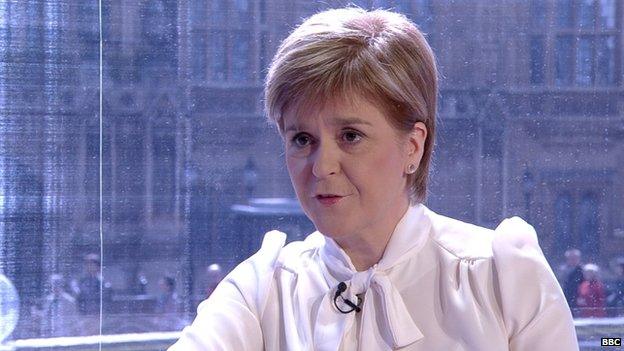Cabinet reshuffle: Amber Rudd and Sajid Javid promoted
- Published
- comments
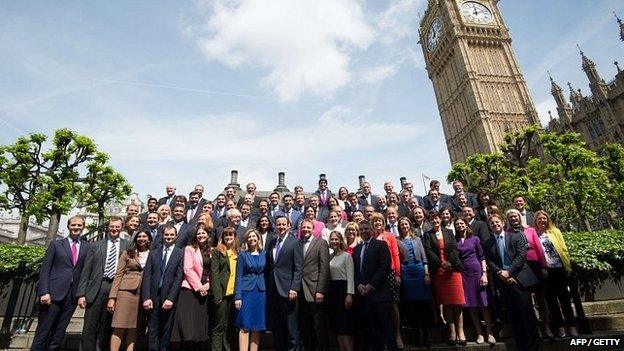
David Cameron and newly elected MPs pose outside the Commons
Prime Minister David Cameron is completing his cabinet reshuffle, with a number of leading female ministers being handed big promotions.
Amber Rudd is Energy and Climate Change Secretary while Anna Soubry and Priti Patel will attend Cabinet as small business and employment ministers.
Boris Johnson will not be made a minister but will attend separate Tory "political cabinet" meetings.
Grant Shapps moved from party chairman to international development minister.
BBC political correspondent Chris Mason said the new job for Mr Shapps, who had a high-profile role in the Conservative election campaign, appeared to be a demotion.
In a break from putting the team together, Mr Cameron met his team of new MPs and was roundly applauded by backbench Conservative MPs as he spoke to the influential 1922 committee for the first time since winning a majority.
In other appointments announced on Monday:
Sajid Javid moves to Business Secretary from Culture Secretary
Greg Hands becomes George Osborne's number two in the Treasury as Chief Secretary
Veteran Tory MP John Whittingdale becomes Secretary of State for Culture, Media and Sport
Greg Clark is promoted from Universities Minister to Secretary of State for Communities and Local Government
Robert Halfon named as deputy chairman of the Conservative Party and minister without portfolio
Oliver Letwin joins the cabinet as head of the Cabinet Office while Matt Hancock becomes Paymaster General and Minister for Civil Service and Efficiency
Iain Duncan Smith remains as work and pensions secretary while Justine Greening stays at international development
Patrick McLoughlin has been reappointed transport secretary while Liz Truss stays as environment secretary
Jeremy Hunt remains at health while Theresa Villiers continues as Northern Ireland Secretary
Stephen Crabb stays in place as Welsh Secretary; David Mundell takes the Scottish Secretary post
Baroness Stowell remains as leader of House of Lords and takes on the role of Lord Privy Seal
Mr Shapps will be replaced as chairman by Lord Feldman
A spokesman for Mr Johnson said he had accepted an invitation to attend weekly political cabinets - held after the full cabinet session - but would not take a ministerial role.
"The mayor has always been clear - he has to fulfil his mandate running London first - and that's exactly what he will be doing until his term ends in May 2016," he said.

Analysis by BBC political editor Nick Robinson
At first sight it felt less like a reshuffle and more like a re-appoint with more than half of the old cabinet - and almost all those in the top jobs - keeping their old posts.
That is a reflection of David Cameron's long-held belief that ministers need time to master their briefs so moving them merely strengthens the hands of those inside and outside departments who are resisting their agenda.
It would be a mistake, however, to see only the continuity and not the change.

As he pieces together his new cabinet, Mr Cameron is filling a number of top roles previously held by Lib Dems in the former coalition government.
Former energy minister Ms Rudd is promoted to take control of energy policy, a role held before the election by Ed Davey. Mr Javid, a rising star in the party, succeeds Vince Cable as business secretary.
And current deputy chief whip Greg Hands will take over from Danny Alexander as Chief Secretary to the Treasury.
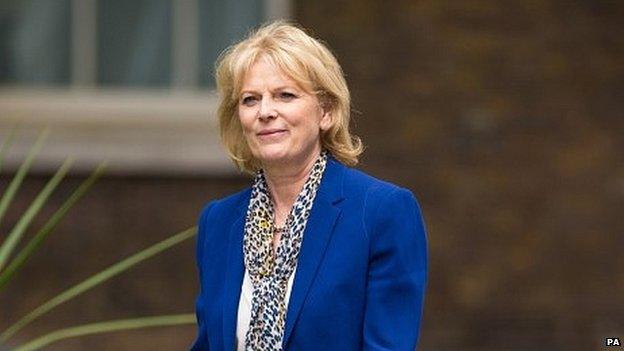
Former defence minister Anna Soubry will attend Cabinet as small business minister
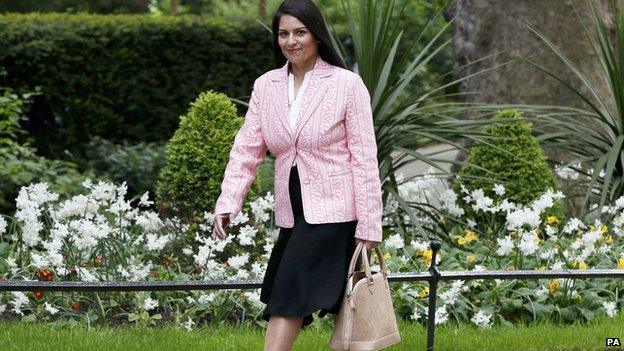
Priti Patel takes the employment brief - previously held by Esther McVey
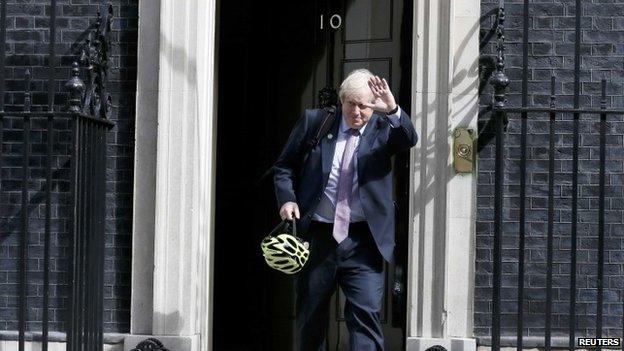
Mr Johnson did not leave empty-handed - he will attend weekly "political cabinet" sessions
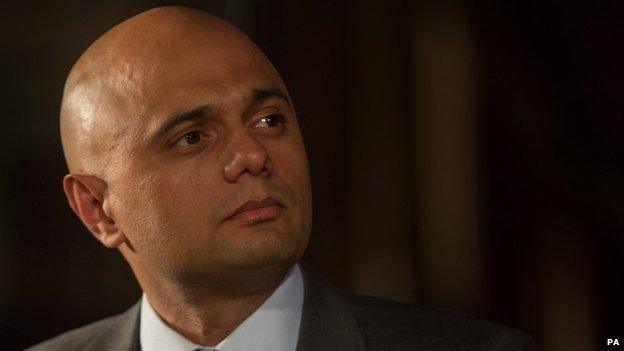
Sajid Javid moves from the culture department to business
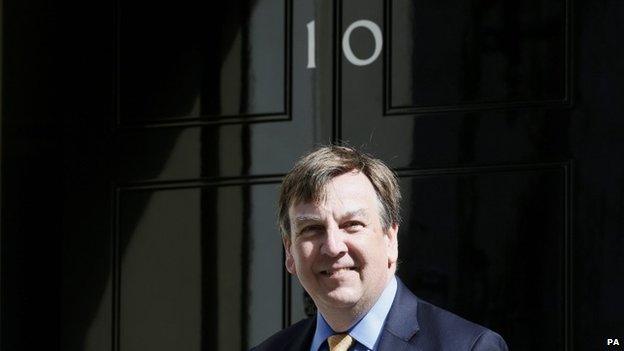
As culture secretary John Whittingdale will lead negotiations on the renewal of the BBC's Royal Charter
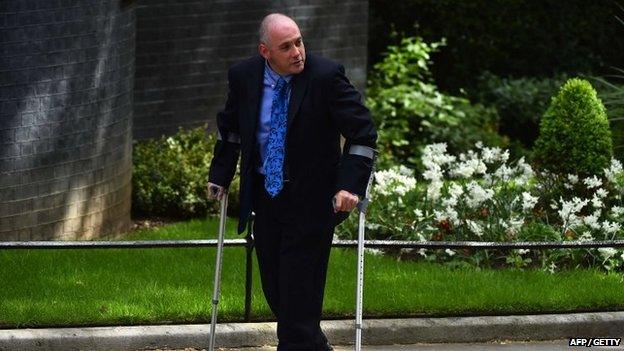
Robert Halfon is the new Deputy Chairman of the Conservative Party
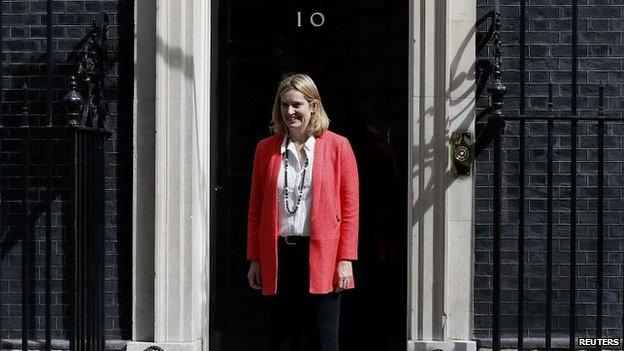
Amber Rudd outside No 10 after becoming climate change secretary
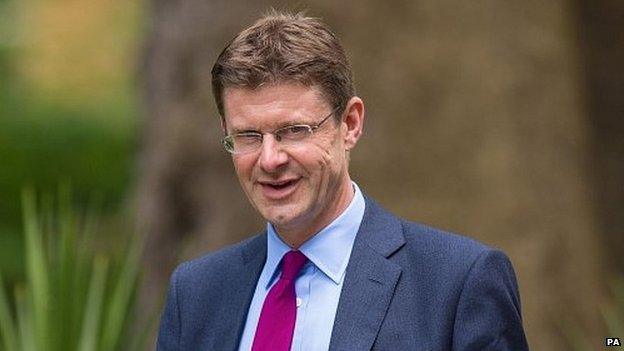
Greg Clark gets a promotion to run the communities and local government department
Mr Whittingdale, a former private secretary to Lady Thatcher, has joined the government for the first time. He was chair of the influential Commons culture committee over the past five years, overseeing its inquiry into phone hacking.
Eric Pickles, who has been replaced as communities secretary by Greg Clark and drops out of the cabinet, said details of his "new role" would be announced in the next few days.
The Conservatives won a 12-seat majority in the House of Commons in Thursday's election, taking 331 of the 650 seats. You can see the full results here.
As MPs return to Westminster, Mr Cameron pledged to ensure the "economic recovery reaches all parts of our country".
Mr Cameron told the 1922 Committee his first term was "about repair and recovery", saying it fell to his party to put the economy back on track after "the great Labour recession", and that the next term is about renewal.
"It will be our task to renew a sense of fairness in our society - where those who work hard and do the right thing are able to get on."
EU negotiations
On Europe, the prime minister said negotiations on reshaping the UK's membership "would be tough but we have a mandate".
Former EU Commission president Jose Manuel Barroso told Radio 4's Today programme he believed other EU leaders would be prepared to accommodate UK demands as long as they were "compatible with the overall project of European integration".
"The anti-European party, the UKIP party was reduced to a very small expression, almost irrelevant," he said.
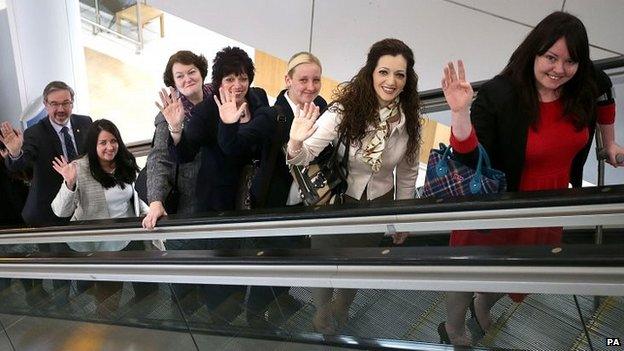
Some of the 56 SNP MPs wave as they head from Glasgow to London
"So today Prime Minister Cameron has internally much greater authority and from my experience - more than 10 years knowing him - I know he is someone determined and someone pragmatic."
However, he suggested some of the Conservatives' pre-election proposals - such as a four-year limit before EU migrants can claim certain benefits - could be "difficult" for other EU countries to accept.
Ministers from Poland, Hungary and Slovakia have told the Financial Times, external they are not prepared to give up on the principle of freedom of movement for their citizens.
In the first salvo over the EU referendum, which Mr Cameron has pledged to hold by the end of 2017, backbencher Graham Brady said not allowing ministers to campaign against continued membership could lead to tensions.
"Where you have people who have very, very strong beliefs about something, it is far better to recognise the strength of those views and to allow latitude and freedom of expression," he told BBC Radio 4's Westminster Hour.

Analysis by Europe editor Katya Adler
The first days in office are challenging for any new government and this will certainly be a busy week for David Cameron who, amongst other things, says he has already rolled up his sleeves to change the UK's relationship with Europe.
The first "fight" with Brussels already loomed large on Monday in the British papers.
The front-page lead story in The Times reported that "Brussels forces Britain to accept Med migrants". Migration is clearly a huge story, and a controversial one for the UK and Europe.

Ahead of Monday's reshuffle, it had already been announced that Michael Gove would be the new justice secretary and Mark Harper the chief whip, while Nicky Morgan would remain as education secretary and minister for equalities.
Mr Cameron also confirmed on Friday that Chancellor George Osborne, Home Secretary Theresa May, Foreign Secretary Philip Hammond and Defence Secretary Michael Fallon would stay in their posts.
As work and pensions secretary, Mr Duncan Smith will now be able to continue his task of overhauling the welfare system and cutting its budget by £12bn. He said this would give him the "opportunity to complete the vital welfare reforms that have already helped so many people back into work".
In other news:
Acting Labour leader Harriet Harman reshuffles the shadow cabinet after warning over a "blame game" over its defeat
UKIP's national executive committee rejects Nigel Farage's resignation as leader. On Sunday Douglas Carswell ruled himself out of the running
Angus Robertson will remain as SNP leader in the House of Commons, the BBC understands, as the party's new intake of 56 MPs are making their way to Westminster for the first time
The British Chambers of Commerce has written to the PM urging him to take bold action to secure the UK's economic future
- Published11 May 2015
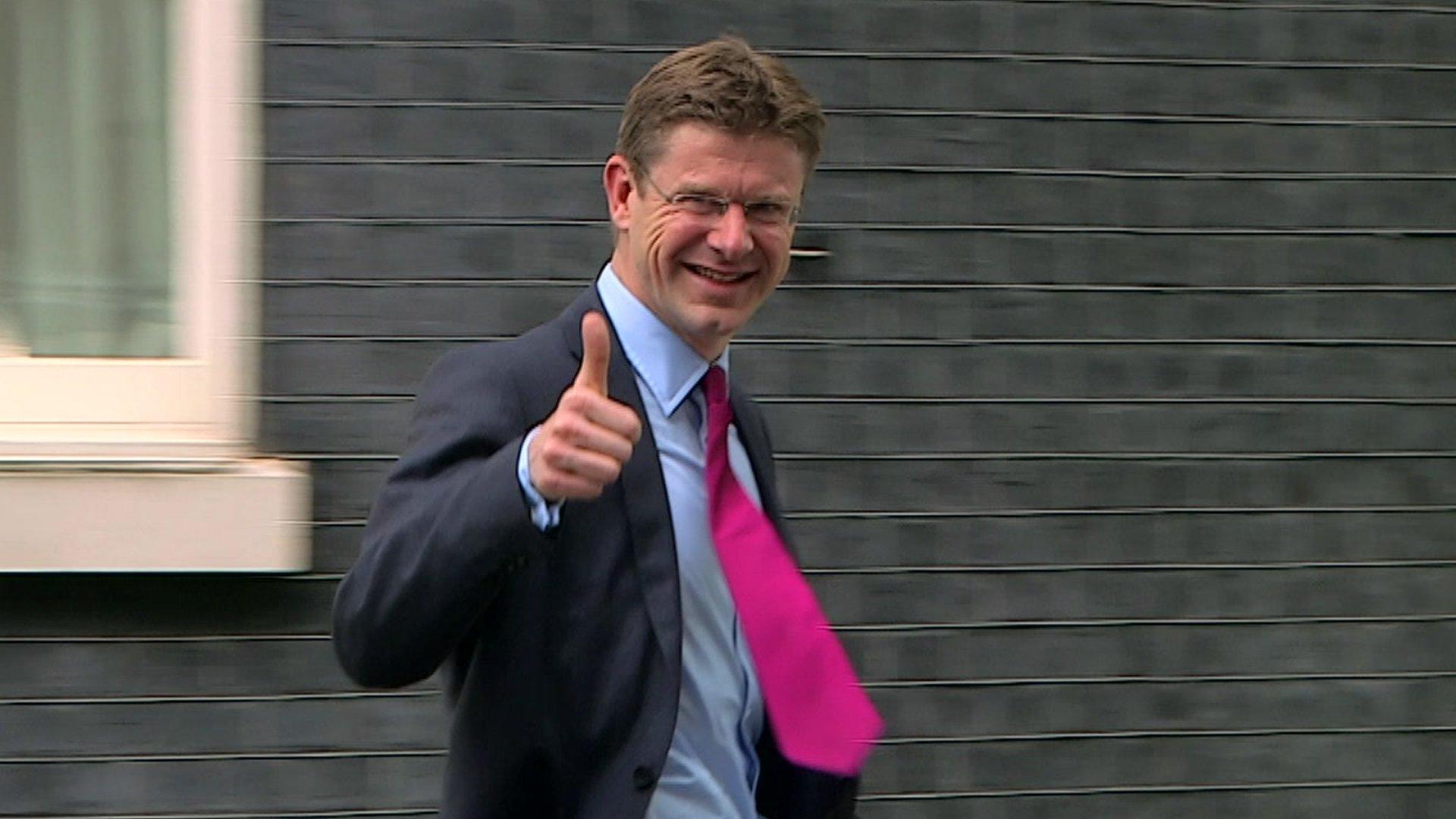
- Published11 May 2015
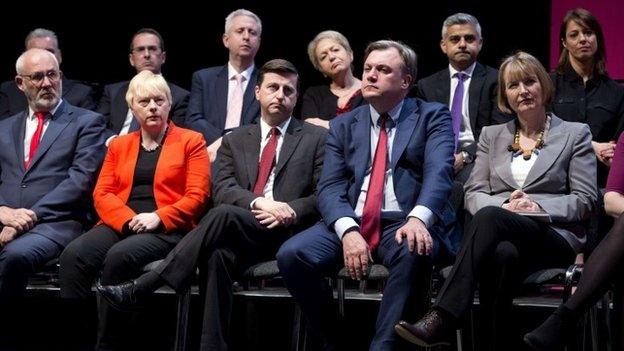
- Published11 May 2015
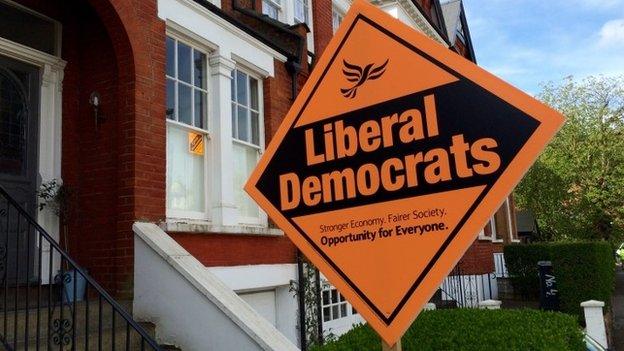
- Published11 May 2015
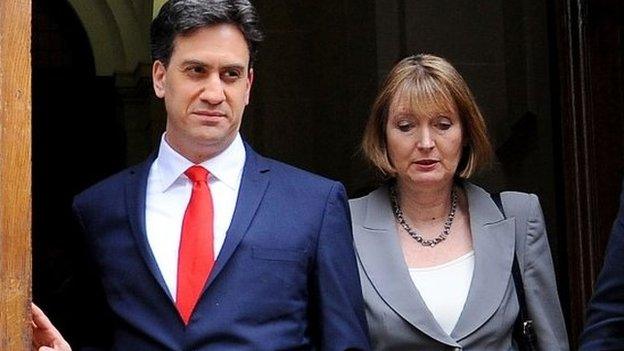
- Published10 May 2015
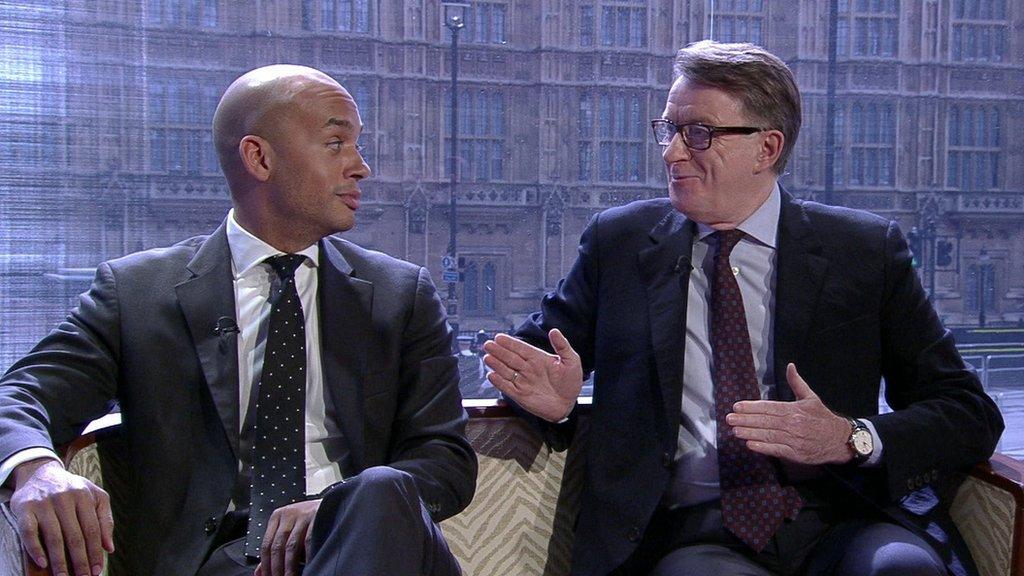
- Published10 May 2015
